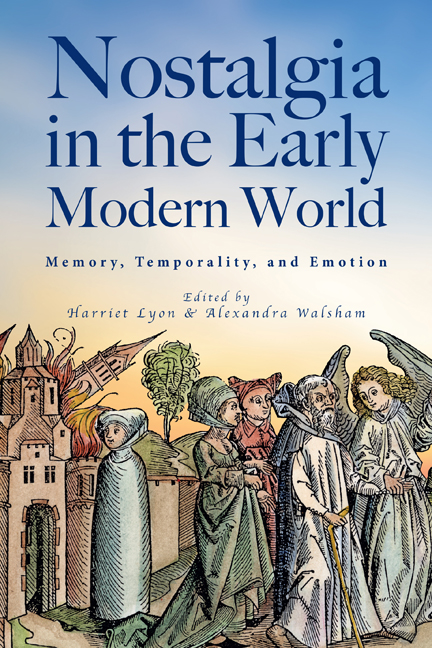4 - Remembering Lot’s Wife: The Sin of Nostalgia in the English Atlantic World
Published online by Cambridge University Press: 11 January 2024
Summary
First coined by the Swiss physician, Johannes Hofer, to describe the fatal malady of homesickness in 1688, the term nostalgia did not find its way into English until 1756 and has drifted in meaning in the centuries since. It has not only lost its original medical and pathological overtones and acquired more sentimental and emotional ones; the locus of the sense of wistful longing it encapsulates has largely moved from a physical space or place to a period of time. Harmless rather than lethal, it is an experience in which sadness and loss mingle with pleasure and desire. It is a mixed feeling. Fusing memory and affect, it is one of the tinted lenses through which we view the past, ‘a temporal accent or orientation’ which involves selective remembering and forgetting in equal measure. The object of its gaze is accordingly a product of the present and a projection of our imagination. A symptom of social upheaval and historical rupture, it is a form of individual and collective subjectivity that also gives expression to anxieties and hopes about the future. To quote Achim Landwehr, ‘it is part and parcel of a turbulence of times that is constantly brought forth by cultures’. It thrives ‘on the rude transitions rendered by history’ in every era.
This essay investigates one of nostalgia's early modern manifestations by focusing attention on a biblical passage that centres upon the idea of ‘looking back’. This is the sobering tale of Lot's wife, the subject of the engraving from Gerard de Jode's Thesaurus sacrarum historiarum veteris testamenti (1585) reproduced as Figure 4.1. One of many iconographical variations on this popular theme, it attests to the pervasive presence of this scriptural topos in early modern culture.5 The source of the story is Genesis chapter 19. The terrifying fate of this anonymous woman is the culmination of a narrative that describes the escape of Lot and his family from annihilation. Lot was a righteous man who had followed his uncle Abraham into exile in Canaan, where they settled in the hills of Bethel, before famine compelled them to seek asylum in Egypt. Driven out by Pharaoh, the pair parted ways. While Abraham based himself in Hebron, Lot took up abode on the fertile plains of Jordan in Sodom. Incensed by the egregious sexual misdemeanours of the city's inhabitants, the Lord determined to destroy it.
- Type
- Chapter
- Information
- Nostalgia in the Early Modern WorldMemory, Temporality, and Emotion, pp. 90 - 116Publisher: Boydell & BrewerPrint publication year: 2023



